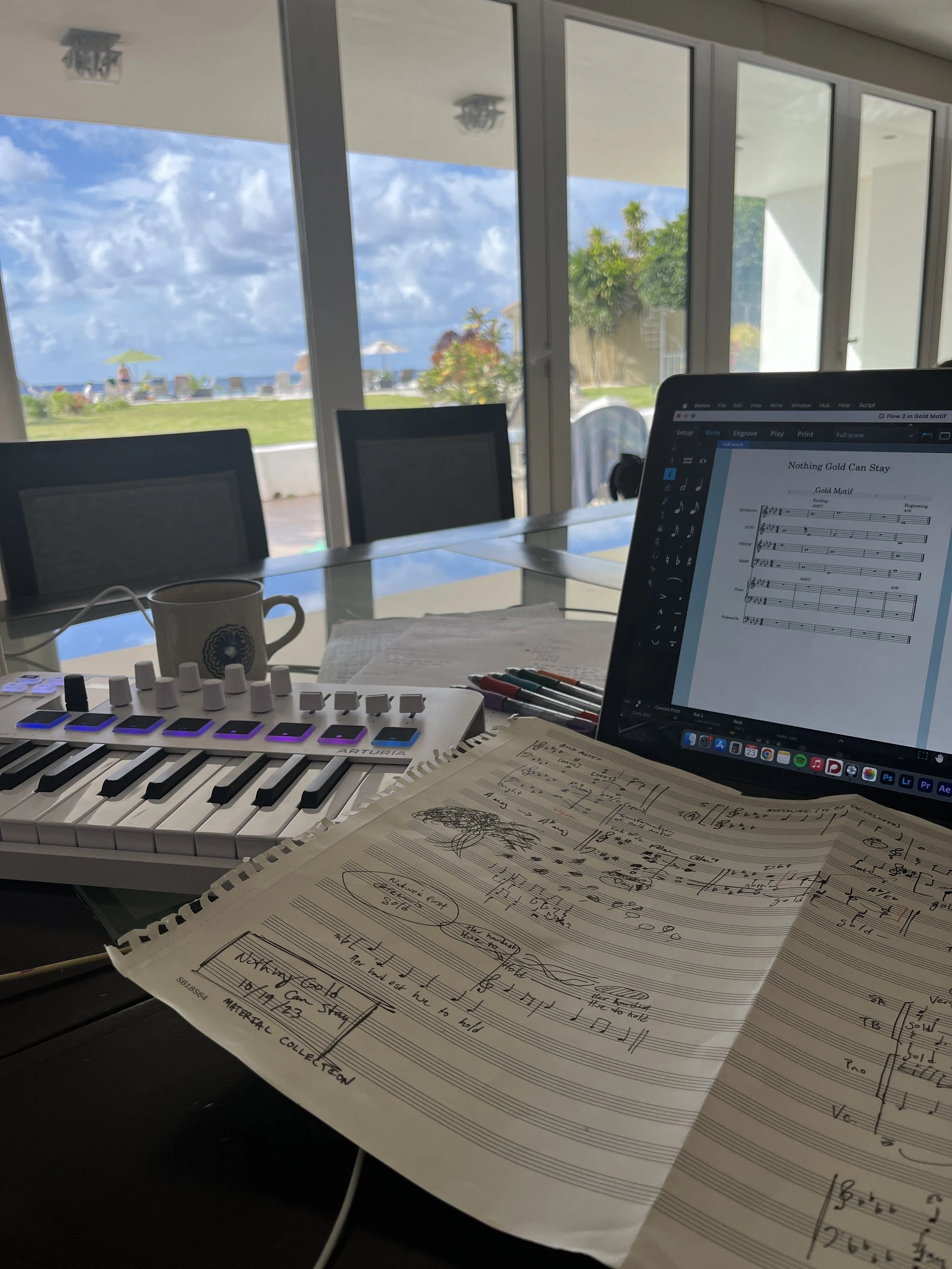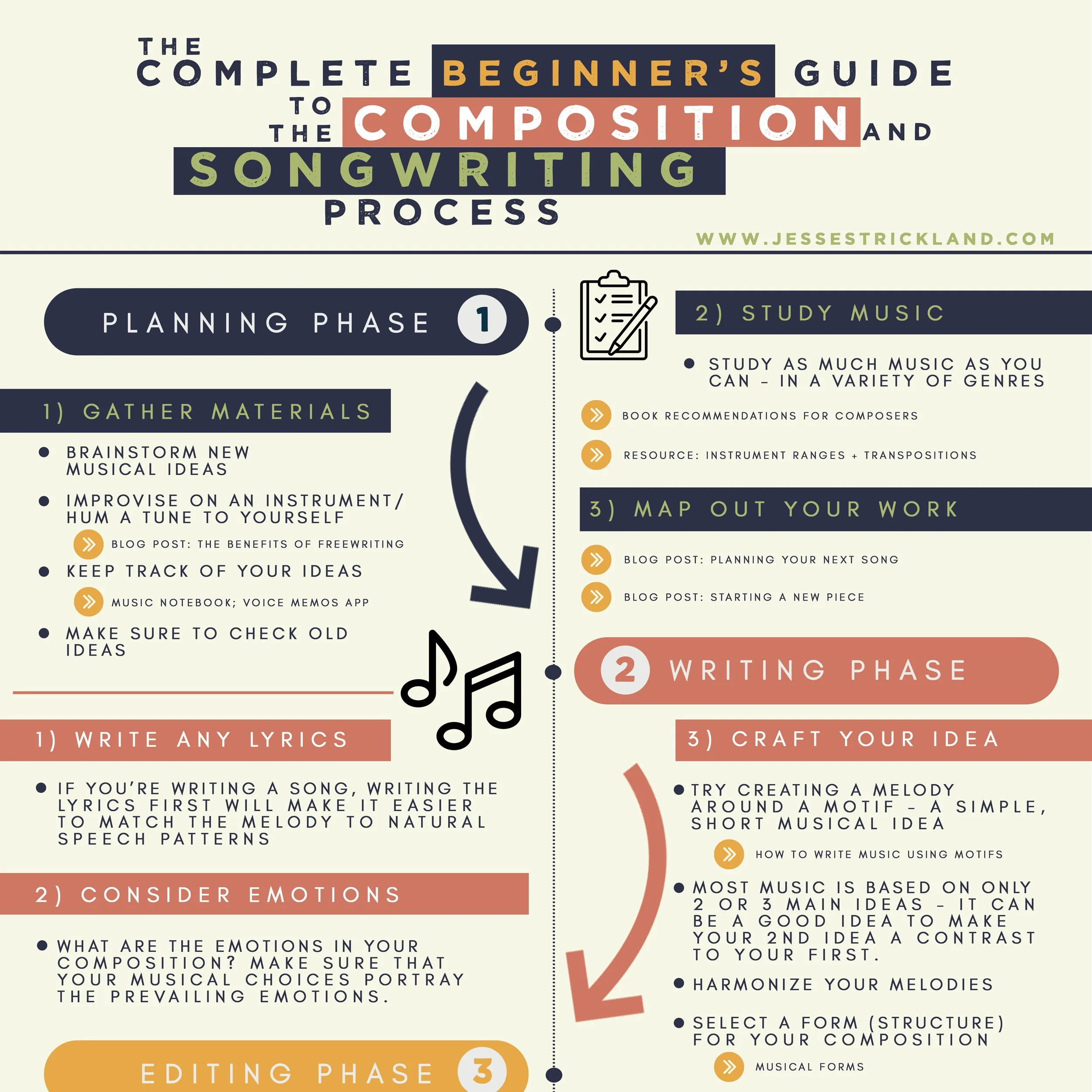
4 Strategies to Finish Your Music Writing Projects
If you are frustrated by unfinished songs and pieces you’re working on: You're not alone. This is one of the most common frustrations I hear from composers, songwriters, and producers that are newer to the music writing. It’s usually one of two things:
1) You’ve written a little something, maybe 8 measures or so, and you can’t figure out where to go next, or, 2) your piece seems disjointed - it's just a random collection of ideas. Both of these will stop progress dead in its tracks.
I feel your pain. I've got a full box of unfinished music sitting in my studio. Here are four strategies that I use to finish my music projects.
1. Overcoming Perfectionism
Perfectionism is one of the biggest roadblocks to finishing music projects. It makes you constantly second-guess your work, leading to endless revisions and even creative paralysis. To combat perfectionism:
Shift Your Mindset: Aim for progress rather than perfection. Understand that no piece of music will ever be flawless, and that’s okay. (would we even like it if it was perfect?)
Set Time Limits: Give yourself a deadline to finish sections of your music. This creates a sense of urgency that can help you move past minor imperfections.
2. Zooming Out for Perspective
Another common issue is getting too caught up in the details, losing sight of the overall structure. If you find yourself obsessing over perfecting every single element without considering the bigger picture, try these steps:
30,000 Feet: Before diving into the details, create a broad outline of your piece. Decide on the overall flow and structure, and then work on the individual sections.
Create a “scale model”: I like to use two tools here: The Short Score, and the Timeline. Both of these allow me to put all of my ideas in physical space. Use these tools to visualize your piece from start to finish. This helps ensure all parts fit together cohesively and prevents well-polished sections from feeling out of place.
Develop and Transition: A huge mistake I see from beginners all of the time is abrupt transitions from one idea to the next. Focus on developing your main ideas and creating smooth transitions between sections to maintain a unified composition.
3. Limiting Your Material
It might seem counterintuitive, but trying to use too much material can be a major roadblock. Many composers feel the need to generate numerous ideas to fill a piece, but this often leads to disjointed music. Instead:
Focus on 1-2 Main Ideas: Most successful pieces are built around a few core themes or motifs. Concentrate on developing these ideas thoroughly.
Development Techniques: Expand, alter, reharmonize, and orchestrate your main ideas to create variety and maintain interest without introducing new material.
Creating Relationships: Ensure that your main ideas relate to each other. Use contrasts in rhythm, dynamics, or register to create a sense of unity and progression.
4. Commit to Consistent Practice
Finishing music requires a commitment to sit down and write regularly. It’s not about finding a magic cure but developing a habit and toolbox to overcome common challenges.
Consistent Practice: Set aside dedicated time for composing and stick to it. Regular practice helps build momentum and keeps you engaged with your work.
Feedback and Revision: Don’t be afraid to seek feedback and make revisions. Use criticism constructively to improve your music and move forward.
This isn’t every single obstacle, but they are the ones I’ve found to be the most common - address these, and you’ll finish more of your music writing projects.
Finish Your Music: A Free Email Course
If you're ready to dive deeper and gain more insights, I’ve written about all of these topics in greater detail in a 5 day email course. It provides practical exercises and detailed strategies to help you overcome these challenges and complete your musical works. It’s completely free, and it will only take about 10-15 minutes per day. These are strategies and exercises that I use in my own writing process - and I think you will find them useful as well.
Enroll Here: https://jesse-strickland.mykajabi.com/finish-more-music-enrollment
Four Things Every New Composer/Songwriter should do
1. Choose Consistency over Quality
Your first compositions aren’t going to be your best. And that’s frustrating - but consistency matters more at this stage. Practice writing a lot - and move on to the next piece. One nice thing about cooking is that it forces you to go through the process and then do it again. You can’t “keep working” on the same grilled cheese sandwich. Cook it, learn from it, try it again. Consistency in the long run will lead to quality.
2. Listen to Music Closely
Really take note of the techniques that other composers are using. Analyze the music, dictate the music, copy the scores by hand, learn to play it on your instrument. This is something else you’ll get better at the more you do it.
3. Listen Widely
I recommend this for any musician, regardless of specialty. Don’t just listen to music in your genre - study across as many genres as you can. You live in a world of infinite genres, let all of them influence your voice.
4. Be Endlessly Curious
Study other arts, ask a lot of questions, experiment constantly, take as many notes as you can, write down everything that comes to your head. I’d wager that every artistic innovation was spurred by curiosity. A lack of curiosity will lead to playing it safe. This is a composer’s best friend, but it is often overlooked. So be curious, and stay curious.
Check out this guide
If you’re new to writing music, I’ve got this free interactive PDF guide to the composition and songwriting process - check it out!
Anyone Can Write Music
Writing music is a craft. It's not a rare gift only given to a select few. And because it's a craft - all musicians can and should write music. And today I’ve got an exercise for you to help you get started.
Writing Music is like Writing Language
Let's think about language for a second. That's what I'm using right now to communicate with you. I could have chosen to communicate with you through a series of colored dots - but that wouldn't have been as effective.
In order to communicate with language, you need to be familiar with that language. I can put together sentences of words and you understand them because I know a lot of words and their meanings, I know sentence structure, and I know what it is that I want to communicate. I'm not inventing any new words to communicate this with you - but I am writing. Well, speaking in this case - but I did write it down in the script before I started speaking. Well, and actually before I wrote this script I spoke these thoughts into my voice memo app. And before that, I actually wrote these... [It cuts off, I start the camera over] You get the point - these are thoughts that I am communicating, and I am capable of that because I have learned English. And these particular thoughts do not require me to revolutionize linguistics.
In the same way, all musicians have within them the ability to communicate through writing music - because they know music.
Composition is Just Expression
Just because you have it inside you, that's not to say you'll immediately be good at it. That seems logical enough. My daughter when she was learning to talk would put together sentences like "me want doing swing", but she kept practicing and now she knows that "I would like to swing" better communicates what she wants.
All composition is just a musical expression. And you "getting better" at composition is you getting better at communicating that expression. And like with everything else in life, that happens through practice.
There's never been more resources
And you'll need to practice quite a bit. But it's worth it. And you might say "I have no desire to compose for a career." But I think literally every single musician can and should regularly express themselves by writing their own music. I write a lot of English all the time despite not being a career Novelist. My goal in writing in English isn't to have my books read by the whole world. I wrote a text message a few minutes ago, and it doesn't mean that I have intentions of become Geoffrey Chaucer.
You've got a lot of resources to help you - more than there have ever been. Countless videos and courses on the internet that you can learn to write music. I had none of that 20 years ago when I was learning to compose.
Not only that. But there are so many resources for you to experiment and learn on your own. With DAWs and Instruments and what not. Spitfire Audio has a free version of their BBC orchestra library that gives you access to practice with a full orchestra. It's Crazy.
I've got a free resource for you today. I've heard from a number of my composition students that keeping track of the whole process of writing a piece is often overwhelming. So, I've got this interactive PDF that outlines the composition process step-by-step. It's got links to 16 additional resources that I think you'll find useful.
A Writing Exercise
If you're still thinking "well, that makes sense - but I already know that I can't write music," I want you to try this exercise. It's going to feel awkward. Fight against that feeling. Composition is messy. And here’s the thing. Our goal today isn’t to write a whole song, or a whole piece. The goal is to just write something. Here’s what I want you to do:
Step 1. Take out your phone, and find your voice memo app.
Step 2. Hum something to yourself. Anything. Long or short, doesn't matter. Don't worry about whether or not it is good. Don't overthink it. Just hum something.
Step 3. Do it again. You might as well leave that voice memo going - you never know what's going to happen. Try to get up to five.
Step 4. Listen back to your voice memo. Let's go ahead and quickly come to terms with the fact that it isn't a Radio quality recording and move past that.
Step 5. What do you feel like each snippet is expressing? Happiness? Confusion? Hunger? If composition is expression, what do the melodies you've come up with express?
Step 6. Identify some fragments that you really like. You're looking specifically for something you could build off of. Again, don't be too critical. You're looking for something that you like, not something you think is good. Or, even what you think other people might think is good. Your identification of things you like is a proof of concept that you can write music.
Step 7. Repeat this entire process quite a lot. Hum to yourself all the time. Eventually, humming a melody will be much easier. You'll end up liking more of what you came up with. And you'll better be able to say what your melodies are expressing.
I'd love to hear from you: do you compose music? If so what kind of music do you write? How did you get into writing music? And if you don't write music - do you want to? What obstacles do you see that keep you from it?





